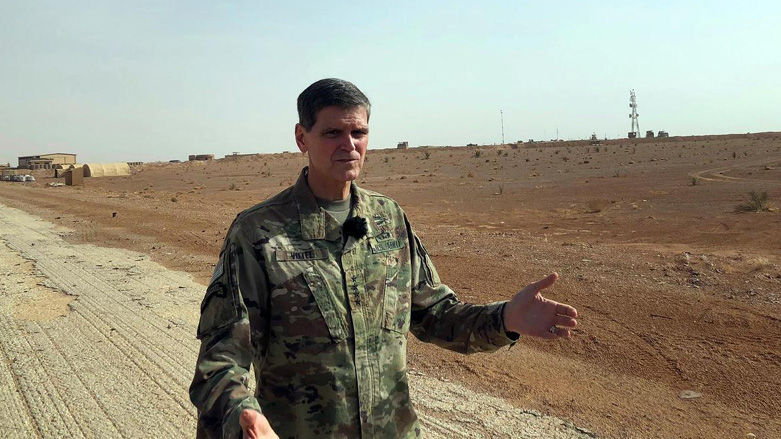US reaffirms commitment to remain in Syria, block Iran

WASHINGTON DC, United States (Kurdistan 24) – On Monday, the top US military officer dealing with the Middle East, the head of Central Command, Gen. Joseph Votel, made an unusual public visit to the small coalition garrison at Tanf.
The Tanf base is manned equally by a few hundred US Special Forces and a similar number of local forces—Syrian Arabs, known as the Maghawir al-Thawra, MaT, or the Revolutionary Commando Army.
The base sits on the Syrian side of the border with Iraq, straddling the main highway between Baghdad and Damascus.
If Iran, or its allies, which include both Iraq and Syria, could gain control of Tanf, that would give Tehran a major route to Lebanon—the so-called “land-bridge” to the Mediterranean.
Israel—which already faces an Iranian “air bridge,” in which Tehran uses Iraqi and Syrian airspace to fly weapons to Hezbollah in Lebanon—is particularly keen to see Iranian land routes to Lebanon blocked.

Votel was accompanied by three US journalists— the first time the US media has been invited to see the small, dusty outpost.
The media outlets were carefully chosen: The Washington Post, a leading US newspaper; NBC News, a major television channel; and the Associated Press, a big wire service—altogether amounting to maximal coverage with minimal persons.
“That visit, and its entourage, is in your face,” Paul Davis, a former Pentagon analyst and currently a Senior Fellow at Soran University, remarked to Kurdistan 24.
“It is a way of saying, ‘We are here. And we’re here to stay,’” Davis affirmed.
Visits by Americans—whether senior military officers, Congressmen, or journalists—to areas in Syria further north, held by the Kurdish-led Syrian Democratic Forces (SDF), are much more common and even scarcely newsworthy.
From a Kurdish perspective, there is particular significance in Votel’s high profile visit to Tanf: a US commitment to remaining in southeastern Syria suggests a parallel US commitment to remaining in northeastern Syria, along with its SDF partners.
Votel explained to the reporters accompanying him that the US mission in Syria remained the defeat of the so-called Islamic State (IS.)
But he also stated that the continued presence of US troops in Tanf had the effect of supporting two major US diplomatic objectives: providing leverage for a political settlement in Syria and blocking Iran.
“We don’t have a counter Iranian mission here. We have a defeat [IS] mission,” Votel said.
But “our presence” here “does have an indirect effect on some malign activities that Iran and their various proxies and surrogates would like to pursue,” he explained.
The development of a serious plan for Syria to maximize US leverage in peace talks and block Iran has followed on the appointments last April of John Bolton as National Security Adviser and Mike Pompeo as Secretary of State.
Those objectives are relatively new and were outlined most clearly and authoritatively by Pompeo earlier this month.
The US estimates that Iran has some 80,000 Shia militia and paramilitary forces in Syria. They include not only Arabs—Syrians, Iraqis, and Lebanese—but Afghans and Pakistanis as well.
The US presence in Tanf is not welcome to Syria or its Russian and Iranian allies.
In early September, US Marines deployed to Tanf for a week of live-fire exercises in a muscular show of force to rebuff Russian probes around the base.
Syrian officials have repeatedly said that the presence of US forces in the country is illegal and they must leave.
Robert Ford, a former US ambassador to Syria, cautioned The Washington Post that the Syrian regime could respond “by working with Islamic extremists as it did” during the US war in Iraq.
Indeed, decades ago, Syria and Iran drove the US out of Lebanon through a terrorist bombing campaign—and later did the same to Israel, which withdrew unconditionally from southern Lebanon in 2000.
Speaking to the State Department press corps on Tuesday, Pompeo began by noting, “Thirty-five years ago today, a Hezbollah terrorist, trained by the Iranian regime, drove a truck packed with explosives into the Marine barracks in Beirut, Lebanon, killing 241 Marines, sailors, and soldiers.”
Editing by Nadia Riva
